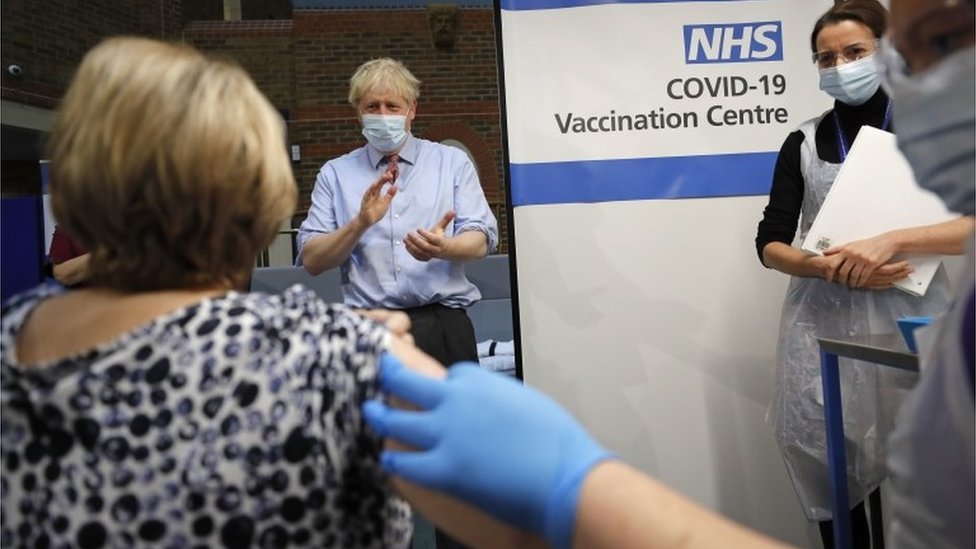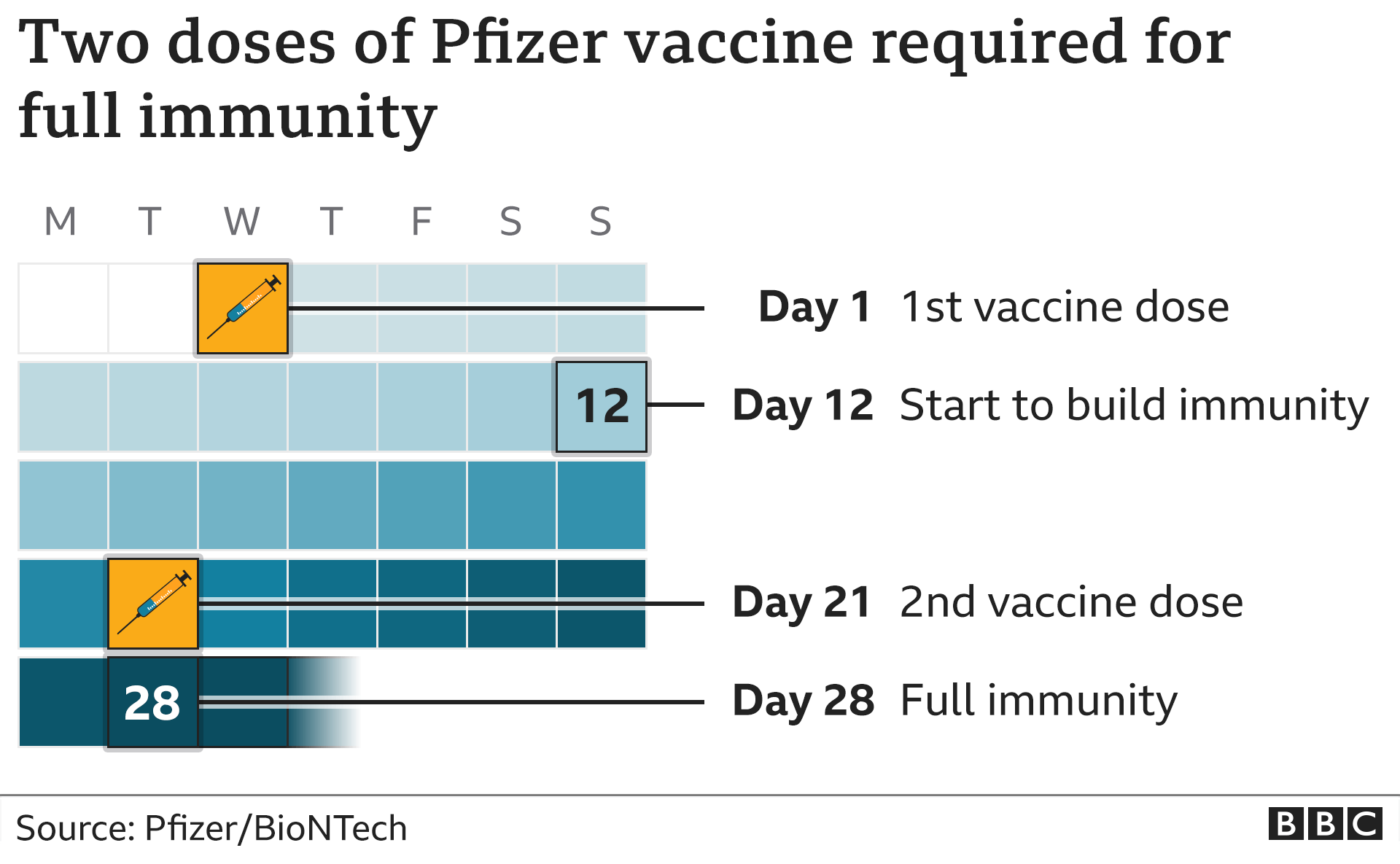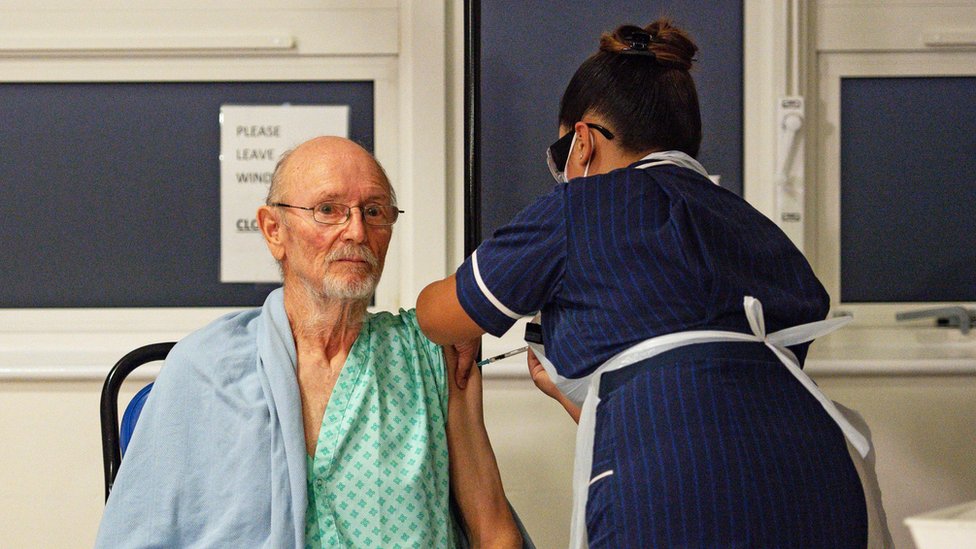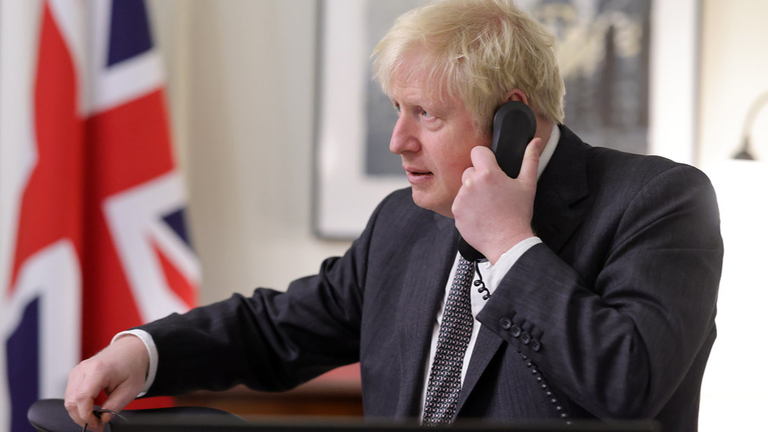A 90-year-old woman has become the first person to be given a Covid jab as part of the mass vaccination programme being rolled out across the UK.
Margaret Keenan, who turns 91 next week, said it was the "best early birthday present".
She was given the injection at 06:31 GMT - the first of 800,000 doses of the Pfizer/BioNTech vaccine that will be given in the coming weeks.
Up to four million more are expected by the end of the month.
Hubs in the UK will vaccinate over-80s and some health and care staff - the programme aims to protect the most vulnerable and return life to normal.
Health Secretary Matt Hancock, who has dubbed Tuesday V-day, said he was thrilled to see the first vaccinations take place but urged people to keep their resolve and stick to the rules for the next few months.
Prime Minister Boris Johnson, on a visit to a London hospital to see some of the first people getting the jab, said getting vaccinated was "good for you and good for the whole country".
About 70 hospitals nationwide are gearing up to deliver vaccines this week.
At University Hospital, Coventry, matron May Parsons administered the very first jab to Ms Keenan.
"I feel so privileged to be the first person vaccinated against Covid-19," Ms Keenan, who is originally from Enniskillen, Co Fermanagh, said.
"It's the best early birthday present I could wish for because it means I can finally look forward to spending time with my family and friends in the new year after being on my own for most of the year.
"My advice to anyone offered the vaccine is to take it. If I can have it at 90, then you can have it too," she added.
Sister Joanna Sloan, who will head up the vaccine rollout in Belfast, received the first vaccine administered in Northern Ireland, just after 08:00 GMT at the Royal Victoria Hospital.
In Wales, a nervous Craig Atkins, 48, from Ebbw Vale, became the first person to get the jab. It was "scary" but he could smile now, he said.
Consultant anaesthetist Dr Katie Stewart was among the first people on Scotland to get the jab, saying there was something to celebrate after "a very long hard year" looking after Covid patients and staying apart to protect each other.
The UK is the first country in the world to start using the Pfizer vaccine after regulators approved its use last week.
Health Secretary Matt Hancock told BBC Breakfast there was a "long march ahead of us but this marks the way out".
While pleased to see the first jabs being given, he said the "virus is deadly" and "we've got to stick by the rules".
On a visit to London's Guy's Hospital, Prime Minister Boris Johnson spoke to 81-year-old Lyn Wheeler, who was the first to receive the vaccine there.
"It is really very moving to hear her say she is doing it for Britain, which is exactly right - she is protecting herself but also helping to protect the entire country," Mr Johnson said.

Earlier, the prime minister thanked the NHS and "all of the scientists who worked so hard to develop this vaccine", the volunteers and "everyone who has been following the rules to protect others".
Some 800,000 doses of the Pfizer/BioNTech vaccine have been secured by the government to be administered in the coming weeks - although vaccination is not compulsory.
Orders have been placed for 40 million in total - enough for 20 million people, as two courses are needed.

However, most of that is not expected to become available until next year, although government sources said another four million doses should arrive in the country by the end of this month.
Mr Hancock said he expected it to take "several weeks" to get the first group of health workers, care staff and over-80s vaccinated.
Vaccine taskforce chairwoman Kate Bingham struck a positive note, telling the BBC her "gut feeling" was that "we will all be going on summer holidays".
It was likely people most at risk would be vaccinated by April, she said, and then the authorities would consider how to broaden out the vaccinations to other adults.

'A momentous day but huge task ahead'

This is a momentous day, but make no mistake the NHS faces a huge task in rolling out this vaccine.
First there needs to be a smooth supply - and already there are reports of manufacturing problems which means the UK is expecting less than half of the 10 million doses of the Pfizer jab it was planning for by the end of the year.
The fact it needs to be kept in ultra-cold storage and in batches of 975 units is an added complication that has meant it cannot yet be taken into care homes to vaccinate residents, who are the very highest priority group, or sent out to GPs to run vaccination clinics in the community.
NHS bosses hope to receive guidance from the regulator next week on how to get around this.
But these factors illustrate why the UK is still pinning its hopes on a second vaccine developed by Oxford University.
That one can be kept in fridges and so is easier to distribute, is British made and - what is more - there is an ever-growing stockpile ready to use.
If that vaccine gets the green light from regulators, there will be a genuine hope the first few months of 2021 will see rapid progress in offering the most vulnerable jabs so the UK can return to something closer to normality.

Prof Stephen Powis, national medical director of NHS England, said 2020 had been a "dreadful" year but life would get back to "normal" in the coming months, he said.
Asked what his message was to people who might have concerns about the Covid jab, he told BBC Breakfast vaccination was "one of the safest forms of medicine".
"This one has been tested in many thousands of people in clinical trials and, of course the independent regulator the MHRA, has looked at it carefully - as it always does - and has given it the green light.
"And so if you get called, we'll be calling you to come and get it, then my advice is come and get it."
People have been asked not to turn up at hospitals expecting to be vaccinated.
A Newcastle Hospitals NHS Trust spokeswoman said a woman in her 90s had turned up at a hospital, having watched the news. People would be contacted when it was their turn, she said.



Are you receiving the Covid-19 vaccine today? Or do you have any questions? Get in touch by emailing haveyoursay@bbc.co.uk.
Please include a contact number if you are willing to speak to a BBC journalist. You can also get in touch in the following ways:
- WhatsApp: +44 7756 165803
- Tweet: @BBC_HaveYourSay
- Please read our terms & conditions and privacy policy
If you are reading this page and can't see the form you will need to visit the mobile version of the BBC website to submit your question or comment or you can email us at HaveYourSay@bbc.co.uk. Please include your name, age and location with any submission.
https://news.google.com/__i/rss/rd/articles/CBMiJmh0dHBzOi8vd3d3LmJiYy5jby51ay9uZXdzL3VrLTU1MjI3MzI10gEqaHR0cHM6Ly93d3cuYmJjLmNvLnVrL25ld3MvYW1wL3VrLTU1MjI3MzI1?oc=5
2020-12-08 10:16:00Z
52781216634638




